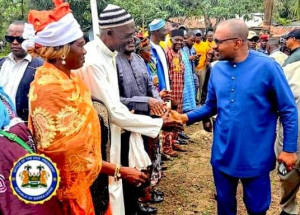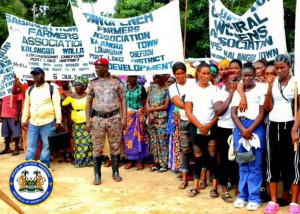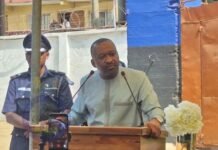By Amin Kef (Ranger)
In an exclusive interview with Le Point, one of France’s most prominent weekly magazines boasting a readership of over 22 million, the Vice President of Sierra Leone, Dr. Mohamed Juldeh Jalloh, discussed his nation’s priorities on the global stage.
He pointed out that with Sierra Leone’s recent election as a non-permanent member of the United Nations Security Council (UNSC) for 2024-2025, the country aims to spotlight the deteriorating security situation in the Sahel as a key international issue.
“We believe the United Nations Security Council remains the premier platform for dialogue to advance peace and security,” said Vice President Juldeh Jalloh. “This is an opportune moment, especially as the Council is under pressure to undergo reforms.”
The Vice President emphasized that Sierra Leone is determined to use its UNSC seat to push for stability initiatives across the Sahel, which has been plagued by rising terrorism and political instability. He highlighted President Julius Maada Bio’s recent visit to Burkina Faso, where discussions with junta leader, Ibrahim Traoré, centered around restoring constitutional order and addressing the growing regional crises. The President’s diplomatic efforts are set to continue with planned visits to Mali and Niger.
Addressing the strained relationship between the Sahel countries and the Economic Community of West African States (ECOWAS), Dr. Juldeh Jalloh underscored that dialogue is still possible. “Burkina Faso, Niger and Mali are founding members of ECOWAS. We believe that building effective relationships with these nations is crucial for restarting dialogue and restoring stability in the region.”
The Vice President also noted Sierra Leone’s own experience under President Bio, a former General who successfully transitioned the country from military to civilian rule in 1996. He believes this history positions Sierra Leone to offer valuable insights in guiding the Sahel nations back to stability.
On the broader international response, the Vice President pointed out the global implications of instability in the Sahel. “What’s happening in the Sahel concerns not just West Africa but the world. If left unchecked, it could threaten socio-economic gains and investments across the region.”
Regarding the recent alignment of Sahel countries with Russia, Dr. Juldeh Jalloh emphasized that Sierra Leone respects the sovereignty of nations in choosing their partners. “These countries are free to make their own decisions regarding foreign cooperation. Our focus is on maintaining dialogue and promoting stability.”
The interview also touched on Sierra Leone’s domestic progress with the Vice President highlighting strides in education, gender equality and infrastructure development since President Bio took office in 2018. He affirmed that Sierra Leone remains open to international partnerships and investment, with plans to establish an Embassy in France as part of this vision.
In conclusion, Dr. Mohamed Juldeh Jalloh reaffirmed Sierra Leone’s commitment to using its UNSC seat to amplify the Sahel crisis and push for actionable solutions that resonate within both the region and the broader international community.
In another development and in line with President Dr. Julius Maada Bio’s commitment to expanding energy access in rural communities, Vice President Dr. Mohamed Juldeh Jalloh on Friday, August 16th, 2024, inaugurated a solar mini-grid facility in Kalangba Town, Lokomasama Chiefdom in the Port Loko District.
The newly commissioned solar mini-grid facility is set to transform the lives of hundreds of residents and businesses by providing reliable and affordable electricity. This development is a significant step toward enhancing the socio-economic conditions of rural communities and fostering growth in small businesses and health centers.
The initiative is a testament to President Bio’s dedication to boosting energy access in underserved areas, a key aspect of his broader vision to drive sustainable development and improve living standards across Sierra Leone.






